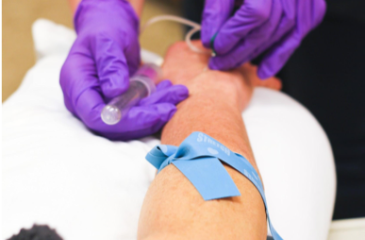The first documented clinical trial took place May 20, 1747 aboard the HMS Salisbury, a 50-gun ship in charge of patrolling the English Channel. Scottish physician and the ship’s appointed surgeon, James Lind, tested a theory about why scurvy was obliterating the British navy. He divided 12 sick sailors suffering from scurvy into six pairs and provided each with a different supplement for their diet. Lind discovered that oranges and lemons had the most positive impact on the sailors’ health, which aided the advancement of a cure for a disease that killed more soldiers than French and Spanish adversaries combined.
Since then, May 20 not only celebrates the history, but also recognizes the hardworking clinical research professionals who are crucial to the conduct of today’s clinical trials and the role research has played in eliminating diseases and improving the quality of patients’ lives.
Today CTSI joins the world-wide celebration to recognize Clinical Trials Day to honor those who are at the forefront of conducting and raising awareness of clinical trials across the health sciences and throughout the University of Minnesota to improve health.
“There are a variety of CTSI teams, functions, and programs that work to make clinical research and trials a more seamless process from start to finish, including helping to clear barriers, connecting researchers to resources and expertise, and engaging communities and participants for University of Minnesota research studies,” said CTSI’s Deputy Director and Clinical Translational Research Services core Director Dr. Dan Weisdorf. “We want to say thank you to the many staff at CTSI and the health research community for their continued efforts in bringing awareness to research and helping ensure Minnesotans live healthier, happier lives.”
A dynamic role in clinical research
CTSI teams, functions, and programs work to make clinical research a more seamless process start to finish—from helping to clear barriers to connecting researchers to resources and expertise, and on through engaging communities and participants for UMN research studies. – Dr. Dan Weisdorf, CTSI Deputy Director & Clinical Translational Research Services core Director
CTSI plays a dynamic role in clinical trials—from funding studies to connecting researchers with participants to training faculty and Minnesota’s clinical research workforce in clinical and translational research.
Here are a few of the ways CTSI impacts clinical trials:
-
Providing early-translational research project support and funding for Minnesota researchers so they can further develop their discoveries into drugs, diagnostics, and devices that will one day be tested in clinical trials and ultimately used in clinical settings to improve human health.
-
Offering research career development programs, mentoring, continuing education and networking opportunities for faculty, continuing education and networking programs for clinical research coordinators, nurses, project managers, regulatory experts, and other staff involved in clinical research. Training focuses on current regulations, best practices, resources, and guidelines pertaining to clinical research at the University of Minnesota and beyond.
-
Providing expertise, connections, and consultations for clinical research studies in critical areas for conducting clinical trials like contracting, clinical trial budgeting, informatics, biostatistics, recruitment, tissue procurement, and regulatory.
-
Bringing together the University’s primary clinical research functional groups and leveraging their expertise in the Clinical Research Support Center (CRSC) to guide and support clinical researchers and study teams and reduce study startup timelines.
-
Partnering with the community to bring clinical research awareness and participation opportunities in ways that are truly relevant to the community through funding, focus groups to inform study design, consultations, collaborator matching, and resources and tools to help inform research and disseminate research outcomes to impacted communities.
-
Providing resources for the public, including StudyFinder, an online clinical trials search tool developed in 2013 to help the public explore, connect and enroll with currently enrolling University of Minnesota health research studies. The StudyFinder web browser is loaded on tablets in the
M Health Clinics and Surgery Center and an interactive kiosk is available to travel to events and buildings in which health-related activities are occurring to help community members find a research opportunity that’s right for them.
Learn more about how CTSI helps researchers, study teams, and clinical research professionals advance discoveries that improve human health.
